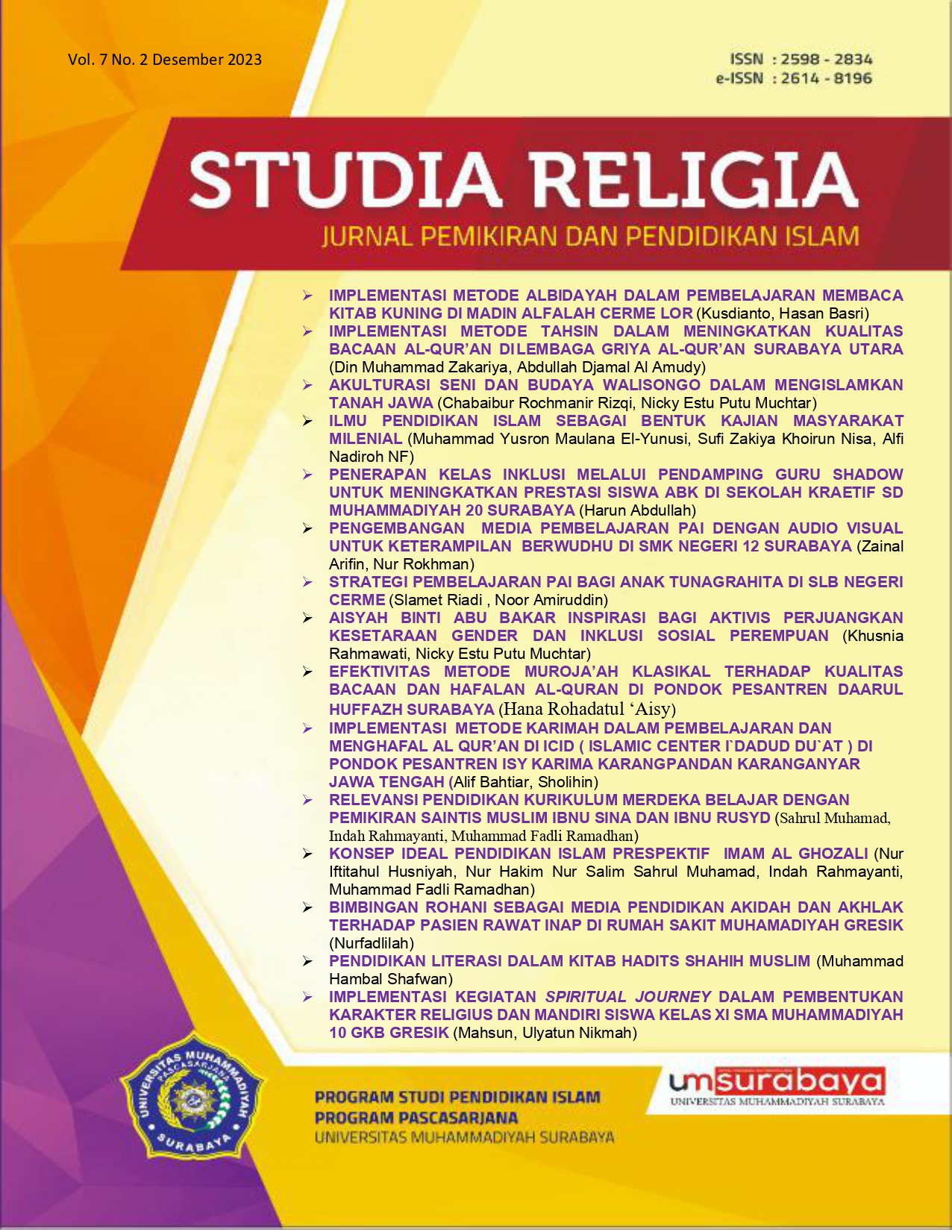EFEKTIVITAS METODE MUROJA’AH KLASIKAL TERHADAP KUALITAS BACAAN DAN HAFALAN AL-QURAN DI PONDOK PESANTREN DAARUL HUFFAZH SURABAYA
DOI:
https://doi.org/10.30651/sr.v7i2.20552Keywords:
Efektivitas, Metode Muroja’ah Klasikal, Kualitas Bacaan Al-Quran, Kualitas Hafalan Al-QuranAbstract
This research was conducted because it was motivated by the importance of understanding Al-Quran for students. By using effective learning methods, it is hoped that it will make it easier for students to deepen their knowledge of Al-Quran, such as the knowledge of reading Al-Quran and memorizing Al-Quran. This type of research is a quantitative research that collects primary data through a questionnaire given to the students of the Daarul Huffazh Islamic Boarding School Surabaya, while the secondary data is obtained from the documents of the Daarul Huffazh Islamic Boarding School Surabaya, after all the data is collected it is further analyzed quantitatively using a simple regression approach. The results of the study concluded that first, the effectiveness of the classical Muroja'ah method on the quality of reading Al-Quran was 66%. Second, and the effectiveness of the classical Muroja'ah method on the quality of memorizing Al-Quran is 73%. Third, the comparison of the effectiveness of classical Muroja'ah on reading Al-Quran and memorizing Al-Quran gets results that show that the effectiveness of muroja'ah on the quality of memorizing Al-Quran is greater than on the quality of reading Al-Quran
References
Anwar, Sumarsih. “Implementation of Tahfidzul Qur ’ an Education At Elementary School-Aged Children At Pesantren Nurul Iman Tasikmalaya.” EDUKASI: Jurnal Penelitian Pendidikan Agama dan Keagamaan 15, no. 2 (2017): 263–282.
Arini, Junita, and Winda Wahyu Widawarsih. “Strategi Dan Metode Menghafal Al-Qur’an Di Pondok Tahfidz Darul Itqon Lombok Timur.” Jurnal Penelitian Keislaman 17, no. 2 (2022): 170–190.
Bastomi, Hasan. “Pendidikan Pesantren Dalam Pandangan Kh. Maâ€TMShum Ahmad Lasem.” INSANIA : Jurnal Pemikiran Alternatif Kependidikan 24, no. 2 (2019): 177–200.
Din. “Metode Mudah Menghafal Al-Qur’an Menurut DR. Ahmad Salim.” TADARUS: Jurnal Pendidikan Islam 08, no. 02 (2019): 72. https://garuda.kemdikbud.go.id/documents/detail/1483746.
Fauzan, Irfan, and Muslimin. “Efektifitas Metode Sorogan Dalam Meningkatkan Minat Belajar Santri….” Jurnal Intelektual: Jurnal Pendidikan dan Studi Keislaman 8, no. 1 (2018): 69–80.
Kusuma, Yuanda. “Model-Model Perkembangan Pembelajaran Btq Di Tpq/Tpa Di Indonesia.” J-PAI: Jurnal Pendidikan Agama Islam 5, no. 1 (2018): 46–58.
Meirani, Ngadri Yusro, Syaiful Bahri, Agustina. “Strategi Peningkatan Minat Menghafal Al Quran Santri Di Pondok Pesantren Arrahmah Curup B.” Didaktika: JURNAL PENDIDIKAN 14, no. 1 (2020): 1–17.
Saptadi, Heri. “Faktor-Faktor Pendukung Kemampuan Menghafal Al-Qur`an Dan Implikasinya Dalam Bimbingan Dan Konseling.” Jurnal Bimbingan Konseling 1, no. 2 (2012): 117–121.
Shafwan, Muhammad Hambal. “KONSEP AL-QUR’AN TENTANG KECERDASAN EMOSIONAL DAN IMPLIKASINYA DALAM PENDIDIKAN ISLAM.” STAIKA 04, no. 02 (2021): 128–141. http://jurnal.staim-paciran.ac.id/index.php/staika/article/view/45.
———. “Pembentukan Karakter Rabbani Di Pesantren Al-Islam Lamongan Jawa Timur Indonesia.” Tadarus 8, no. 1 (n.d.): 77–82. http://repository.um-surabaya.ac.id/3941/.
———. “Tahfidz Al-Qur’an Education in Elementary Age Children with the Taghanni Talaqqi Method at Mim 02 Sedayulawas Brondong Lamongan East Java Indonesia.” Education Journal 12, no. 4 (2023): 121–129. https://www.sciencepublishinggroup.com/article/10.11648.j.edu.20231204.12.
Sugiyono. Metode Penelitian Kuantitatif, Kualitatif, Dan R&D. Bandung: Alfabeta, 2010.
Triyoga, Bambang, and Anjar Sulistyani. “Alquran Sebagai Materi Utama Pendidikan Pada Zaman Rasulullah.” SALAM: Jurnal Sosial dan Budaya Syar-i 8, no. 5 (2021): 1463–1482.
Downloads
Published
Issue
Section
License
Copyright (c) 2023 Hana Rohadatul Aisy

This work is licensed under a Creative Commons Attribution-NonCommercial 4.0 International License.
Penulis tetap memegang hak atas karyanya dan memberikan hak publikasi pertama kepada jurnal ini yang secara simultan karya tersebut dilisensikan di bawah:
Creative Commons Attribution-NonCommercial 4.0 International License









